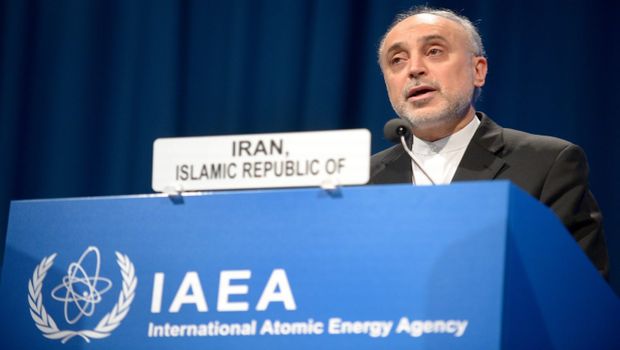
Ali Akbar Salehi, head of Iran’s Atomic Energy Organization and former foreign minister of Iran, delivers a speech at the IAEA General Conference in Vienna, Austria, September 16, 2013. (EPA/ROLAND SCHLAGER)
“Twenty percent uranium and [nuclear] fuel plates are being produced in the country and there has never been a halt in the production process,” the head of Atomic Energy Organization of Iran (AEOI), Ali Akbar Salehi, said in a statement published by the semi-official Fars news agency on Wednesday.
“No halt has occurred in the process of the production and it never stopped before,” he added.
The issue of the enrichment of some of Iran’s stockpile of uranium to contain 20 percent of the Uranium-235 isotope is a key point in negotiations between the Islamic Republic and the West.
Although uranium enriched to this level is used to fuel research reactors that produce isotopes used in some medical treatments, it is a short technical step to enrich it further to the levels needed for a nuclear weapon.
Salehi’s comments contradict claims from earlier this month by the spokesman for the Iranian parliament’s foreign affairs committee, Hossein Naqavi Hosseini.
Hosseini said Iran was temporarily halting enriching uranium above the level needed to fuel reactors that produce electricity and that it had sufficient stockpiles of the more enriched material for its research reactor.
“Enrichment over five percent depends on the needs of the country. Iran’s nuclear industry needs 20 percent enrichment to provide the fuel for its research reactor in Tehran, but the site has the fuel it requires at the moment and there is no need for further production,” he said.
Naqavi’s comments attracted widespread attention, although as a legislator he is not a member of Iran’s nuclear negotiating team or an official of the AEOI.
It is unclear at this stage who is correct, or if Salehi’s claims are an attempt to maximize Iran’s room for manoeuvre in forthcoming negotiations between Iran and the P5+1 (the permanent members of the UN Security Council and Germany).
A halt in Iran’s uranium enrichment to 20 percent would meet a main demand of the world powers negotiating with Tehran over its controversial nuclear program, and would be a possible step towards a final settlement.
Iran already expressed readiness to make some concessions on its nuclear program during the previous round of talks with the group, which ended on October 16.
However, in return for taking such a step, Iran is likely to demand the lifting of some of the stringent economic sanctions that have done serious damage to its economy and its ability to engage in international trade.
This week, experts from Iran and the P5+1 held technical discussions in the Austrian capital of Vienna, prior to another round of talks between senior officials in Geneva next week.
